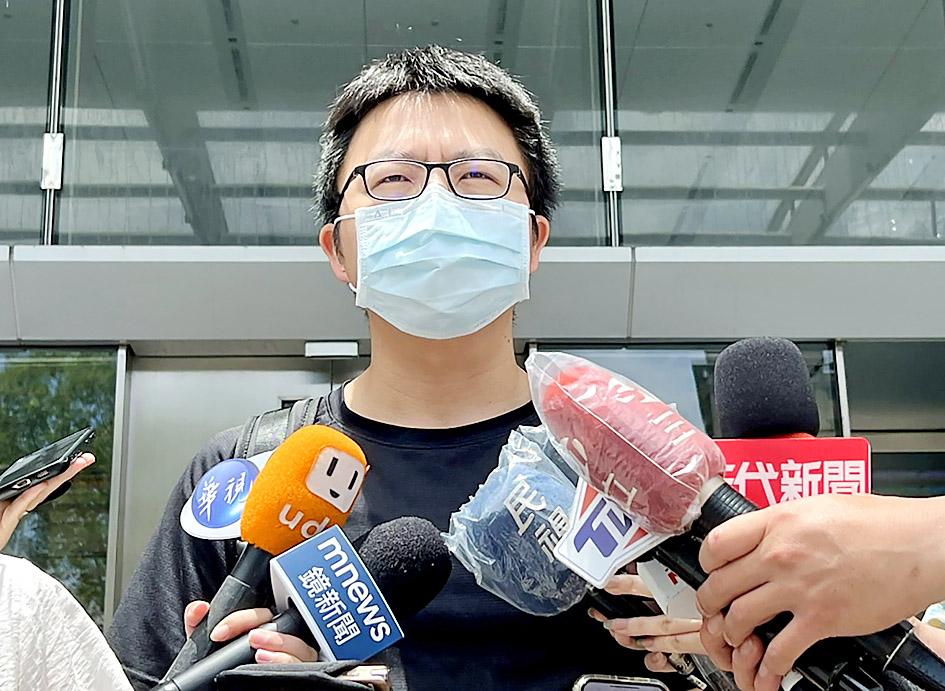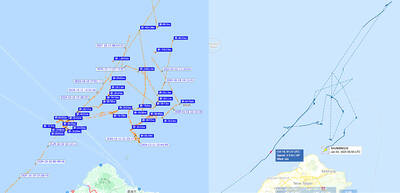The father of a two-year-old boy who died from COVID-19 complications last month expressed frustration on Thursday after the New Taipei City Government refused to provide an audio file of the call he and his wife made to request an ambulance.
Speaking to reporters outside city hall in Banciao District (板橋), the father, surnamed Lin (林), said that he was given a verbatim transcript and told he could only listen to the audio onsite.
The city told him this was because the recordings have the voices of fire department personnel, which are protected under the Personal Data Protection Act (個人資料保護法), Lin said.

Photo: CNA
He was told that he can go to the New Taipei City Fire Department at any time to compare its recording against the transcript, Lin said.
“This is totally absurd,” he said, referring to the claims about personal data protection, which he said was not an issue when he applied for and received the recording of his call to the 1922 hotline in a similar request to the Centers for Disease Control.
Earlier this week, the father and his wife filed applications with the New Taipei City Government, the Jhonghe District (中和) Public Health Center and the 1922 hotline asking them to release recordings of the phone calls they made.
In a Facebook post on Monday, Lin urged the government to explain why it had taken 81 minutes for an ambulance to arrive to take his son to hospital, a delay that he said contributed to the child’s death.
The boy was treated for six days at Shuang Ho Hospital in Jhonghe, but died on April 19, the first child in Taiwan to die of COVID-19 complications.
On Thursday, New Taipei City Fire Department Director Huang Te-ching (黃德清) said that Lin did not listen to the recordings when he picked up the transcript at city hall.
The 119 calls are emergency case reporting that contain personal information, which is different from a 1922 call, which is why Lin was provided with only the transcript and not an audio file, Huang said.

DEEPER REVIEW: After receiving 19 hospital reports of suspected food poisoning, the Taipei Department of Health applied for an epidemiological investigation A buffet restaurant in Taipei’s Xinyi District (信義) is to be fined NT$3 million (US$91,233) after it remained opened despite an order to suspend operations following reports that 32 people had been treated for suspected food poisoning, the Taipei Department of Health said yesterday. The health department said it on Tuesday received reports from hospitals of people who had suspected food poisoning symptoms, including nausea, vomiting, stomach pain and diarrhea, after they ate at an INPARADISE (饗饗) branch in Breeze Xinyi on Sunday and Monday. As more than six people who ate at the restaurant sought medical treatment, the department ordered the

A strong continental cold air mass and abundant moisture bringing snow to mountains 3,000m and higher over the past few days are a reminder that more than 60 years ago Taiwan had an outdoor ski resort that gradually disappeared in part due to climate change. On Oct. 24, 2021, the National Development Council posted a series of photographs on Facebook recounting the days when Taiwan had a ski resort on Hehuanshan (合歡山) in Nantou County. More than 60 years ago, when developing a branch of the Central Cross-Island Highway, the government discovered that Hehuanshan, with an elevation of more than 3,100m,

Taiwan’s population last year shrank further and births continued to decline to a yearly low, the Ministry of the Interior announced today. The ministry published the 2024 population demographics statistics, highlighting record lows in births and bringing attention to Taiwan’s aging population. The nation’s population last year stood at 23,400,220, a decrease of 20,222 individuals compared to 2023. Last year, there were 134,856 births, representing a crude birth rate of 5.76 per 1,000 people, a slight decline from 2023’s 135,571 births and 5.81 crude birth rate. This decrease of 715 births resulted in a new record low per the ministry’s data. Since 2016, which saw

SECURITY: To protect the nation’s Internet cables, the navy should use buoys marking waters within 50m of them as a restricted zone, a former navy squadron commander said A Chinese cargo ship repeatedly intruded into Taiwan’s contiguous and sovereign waters for three months before allegedly damaging an undersea Internet cable off Kaohsiung, a Liberty Times (sister paper of the Taipei Times) investigation revealed. Using publicly available information, the Liberty Times was able to reconstruct the Shunxing-39’s movements near Taiwan since Double Ten National Day last year. Taiwanese officials did not respond to the freighter’s intrusions until Friday last week, when the ship, registered in Cameroon and Tanzania, turned off its automatic identification system shortly before damage was inflicted to a key cable linking Taiwan to the rest of